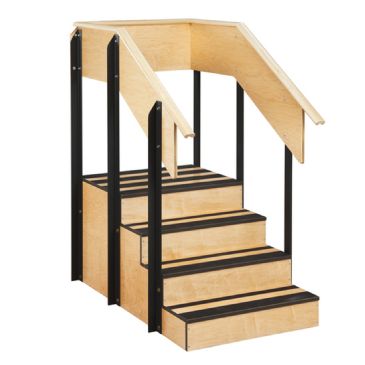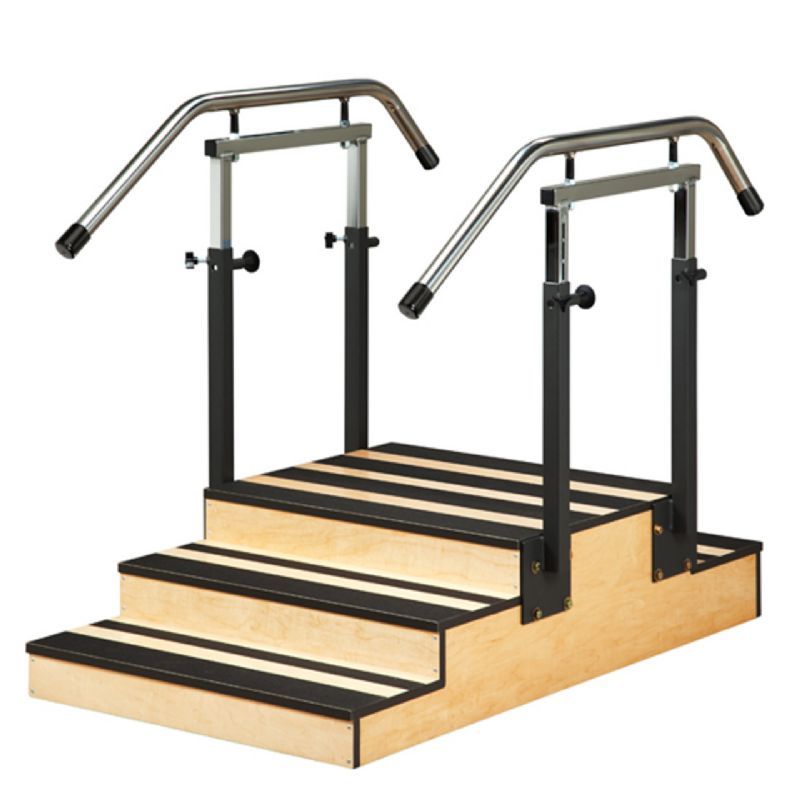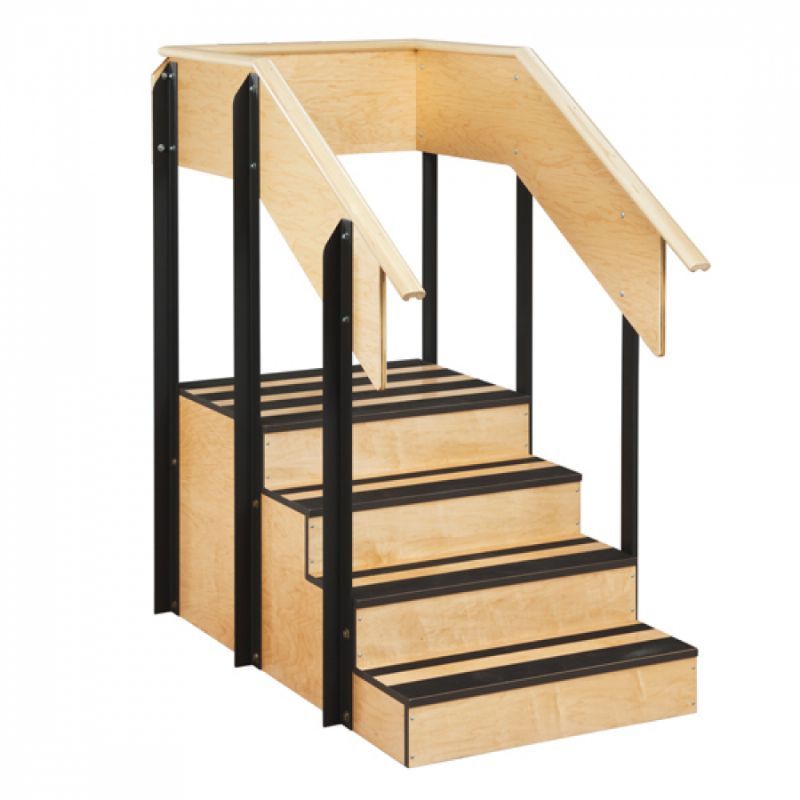 Written by Megan Smith, PT
Written by Megan Smith, PT
During mobility rehabilitation following surgery or an injury, progressive stepping is one of the most challenging movements to recover. Physical therapists often utilize training stairs to help patients regain range of motion for sloped movement. Every model features a comfortable grip and anti-slip surfaces, and there are different designs to choose from that accommodate treatment settings and patient needs.
 | 1) Clinton Classic Series One-Sided Staircase View Product |
#5 on our list is the Patented 3-in-1 Training Staircase by Hausmann Industries, which trains patients on three progressive stair levels.
Set up to allow patients to become adjusted to different size steps, each side provides a slightly different therapy experience. One side has six 4-inch steps, one has four 6-inch steps, and one side has three 8-inch steps. The 36-inch wide stairs have BrightStep 3mm edging, making each step more visible to the user.
The handrail on the 8-inch step side of these training stairs for rehab is easily detached and locked back into place when needed. This training staircase needs a minimum ceiling height of at least 9 feet, and it can accommodate users up to 350 pounds.
The unique design providing varied therapy opportunities sets our number 4 pick apart, as it provides practice on multiple stair sizes to help patients regain the ability to safely navigate steps.
With a weight capacity of 1,000 pounds, the heavy-duty Bariatric Training Stairs by Bailey Manufacturing Company has earned the #4 spot on our list.
Made from hardwood and tubular steel, these training stairs build balance, coordination, agility, and confidence while providing low-impact cardio exercise for patients. The steps are 48 inches wide, and the bolted end-to-end triple-level handrails are stable and secure, so bariatric patients can be comfortable and confident during therapy. Every surface has non-slip treads. On one end, a wider platform area is alternated with narrow treads, and on the other end, there are three narrow treads leading to the top.
The step height is 6 inches, with a tread depth of 10 inches. The footprint measures 78” x 104” and the minimum ceiling height is between 102 and 108 inches. These training stairs can be a crucial element of physical therapy designed to increase activity and build strength among bariatric patients of any age.
These training stairs made our list because they are a great tool for helping bariatric patients develop strength, balance, agility, coordination, and most of all confidence. The progression of easy to challenging climbing can have a significant impact on a patient’s rehab success.
The available configurations of our #3 pick Convertible Exercise and Training Stairs by Bailey Manufacturing Company provides users with practice in multiple stair-climbing real-life simulations.
These training stairs have two sections that can easily and securely be converted from a straight line to a right angle, firmly locking in place for safety and stability. The eight stairs on one side and four stairs on the other side provide progressively more difficult therapy with riser heights of 3 and 6 inches. With angle iron vertical supports for each stair section, this piece of equipment is built to last. Its hardwood handrails have three levels to accommodate adults and children. Textured treads prevent slips or loss of balance.
This equipment has two riser heights and allows for customization of treatment in consideration of the user’s individual health. For patients participating in therapy to improve their gait or rehab after an injury, this unit provides real-life practice. There are three models available, each with a 500-pound weight capacity.
For therapists working with patients on gait, balance, and coordination, the number 2 pick on our list will help users regain the ability to safely and quickly climb stairs. Its straight or 90-degree configuration provides multiple real-life options to help patients achieve their goals for therapy.

If you stop for a moment and think about climbing stairs, you realize how complex this ability truly is. The sole task of going up and down involves a good amount of balance, strength, and coordination. The Clinton Adjustable Small Staircase understands how challenging it can be to start over, that's why it helps many users recover inside a safe, affordable, and customizable environment.
The Clinton Training Stairs come with anti-slip threads on every step to grant you a solid safe going up and down. The heavy-duty handrails let you adjust their height to fit your needs and ensure a proper grip. This product was designed to be a safe space for training without the need for expensive remodeling costs.
Made only with premium wood, the Clinton Training Stairs support up to 450 lbs. These heavy-duty training stairs will help you recover your strength, mobility, and independence. The stainless steel of the handrails provides a reliable aid to enable safe step by steps. The best feature about these training stairs is that they can be placed in your favorite area and do not require expensive remodeling.

We usually do not realize how incredible our body and muscles are by performing a daily task like standing, walking, or climbing stairs until we need to recover those capacities. Getting back on track becomes a safe and personal experience thanks to the Clinton Classic Series One-Sided Staircase. These training stairs easily fit your spaces and let you recover at your own pace, without interruptions or restrictions.
Designed to make you feel confident and safe while also allowing results, the Classic Series One-Sided Staircase by Clinton Industries includes a sturdy pre-assembled hardwood handrail to ensure you get a solid surface to count on. The heavy-duty steel uprights provide sufficient weight to prevent these stairs from sliding when training. Feel comfortable practicing inside a secure area and height with anti-slip treads taking care of you while you go up and down.
The Clinton Classic Series One-Sided Staircase features only high-quality materials like solid hardwood and heavy-duty steel braces and fasteners to create a product you can trust. For best convenience, the handrails and uprights come pre-assembled, so you only need to worry about selecting your preferred stairs' width and deciding where to place them.
Pay close attention to the floor space and the ceiling height that will be required to accommodate the footprint of a set of training stairs.
Bariatric patients need wider and sturdier equipment. Equipment sized for non-bariatric patients often doesn’t provide enough space for larger patients. Bariatric patients often can’t fit into equipment that is not designed for their body type, but non-bariatric patients can often use bariatric equipment, so getting larger equipment can serve more than one part of the patient population.
Often training stairs will have optional step depths and riser distances. The more exposure a patient has to different step configurations, the easier it will be to navigate stairs in real life.
To protect the practice’s investment, durability should be a high priority. When built to last, these training stairs for rehabilitation can deliver a long service life that provides a positive return on the initial investment.
Physical therapists use training stairs with patients who need progressive stepping therapy after an injury or a surgical procedure. The stairs are designed to provide a comfortable grip and safe, anti-slip platforms for rehabilitation purposes.
Training stairs with bus step train the muscles to move in ascending or descending, using training methods of walking up and down stairs or practicing stepping on and off curbs.
Offering plyometric motion, which uses the same muscles and squats and lunges, stair training provides gait training and builds balance, endurance, agility, strength, and confidence for users who are participating in a rehabilitation program.
The ability to safely and confidently navigate stairs is an important daily life activity that adds to your quality of life. When that ability is compromised by a health condition, mobility rehabilitation using training stairs can help patients recover progressive stepping and regain the range of motion necessary to safely climb stairs.
Our number 1 choice for best training stairs for physical therapy is the Dynamic Physical Therapy Star Trainer, which earned the top spot on our list because of its convertible and adjustable design. Patients can begin using it sooner than other training stairs, and it adjusts in small increments to accommodate whatever personal progress the patient makes.
For more products, view Rehabmart’s complete line of Training Stairs, Stairs Workout, and Step Climbers. And before you leave, be sure to check out Caregiver University for more helpful articles!

Megan has been a part of Rehabmart since its inception nearly 20 years ago. For the past several years she has been enjoying her role as HR Director while maintaining her Physical Therapy license. When she isn't working on her next in-service or working to find a new team member, she enjoys her five children, helping those who have PT type ailments, baking, practicing yoga, and working out.